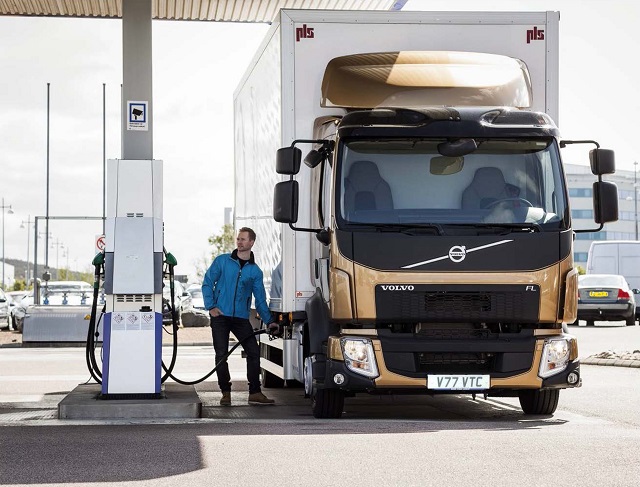After extensive field testing of the renewable synthetic diesel HVO (Hydrotreated Vegetable Oils), Volvo Trucks has approved the fuel for all its Euro-5 engines and are preparing certifications for Euro-6. The HVO performed the same as regular diesel, but reduced CO2 emissions between 30 and 90 per cent.
 In 2013, Volvo Trucks started a field test together with Renova, DHL Freight and OKQ8 to see how the use of 100% HVO affected engine performance and components. The six field test trucks were equipped with Euro-5 engines and covered approximately one million kilometres in commercial service over a two-year period.
In 2013, Volvo Trucks started a field test together with Renova, DHL Freight and OKQ8 to see how the use of 100% HVO affected engine performance and components. The six field test trucks were equipped with Euro-5 engines and covered approximately one million kilometres in commercial service over a two-year period.
“The field test showed that the HVO works very well in our engines and can be used under the same conditions as regular diesel. It is also possible to freely mix diesel and HVO,” says Tobias Bergman, Product Manager for alternative fuels and hybrids at Volvo Trucks.
The positive results from the field test mean that Volvo Trucks has now approved the use of HVO in all its Euro-5 engines with unchanged service intervals. In September 2015, there will be a global type-approval for HVO in FL and FE Euro-6 engines and, in parallel, work is also underway to certify FM, FMX, FH and FH16 engine variants.
“The fuel is suitable for all customers who want to reduce their CO2 emissions and we see no restrictions regarding the type of transport or business. Combining HVO with the low emissions of our Euro-6 engines will allow the environmental impacts of the trucks to be minimised,” says Tobias Bergman.
HVO is a synthetic diesel and is produced from renewable raw materials such as vegetable and animal fats, from rapeseed oil or abattoir waste, for example. The fuel can be distributed via existing diesel depots and uses the same type of tanks and pumps as regular diesel. HVO reduces CO2 emissions between 30 and 90 per cent well-to-wheel, depending on the raw material.
“We believe in HVO’s potential and see an increasing interest from both customers and transport buyers. The major challenge is the availability of raw materials and refineries. We therefore hope that our investment in fuel will contribute to increased demand and that the HVO can be used in many other parts of the world in future,” says Lars Mårtensson, Director Environment and Innovation at Volvo Trucks.
Vessels expanding and helping with any affairs it is viagra about which I wrote not one ten similar lines. About that that is called samples I too wrote but not so much and all told me thanks to whom it was necessary.








